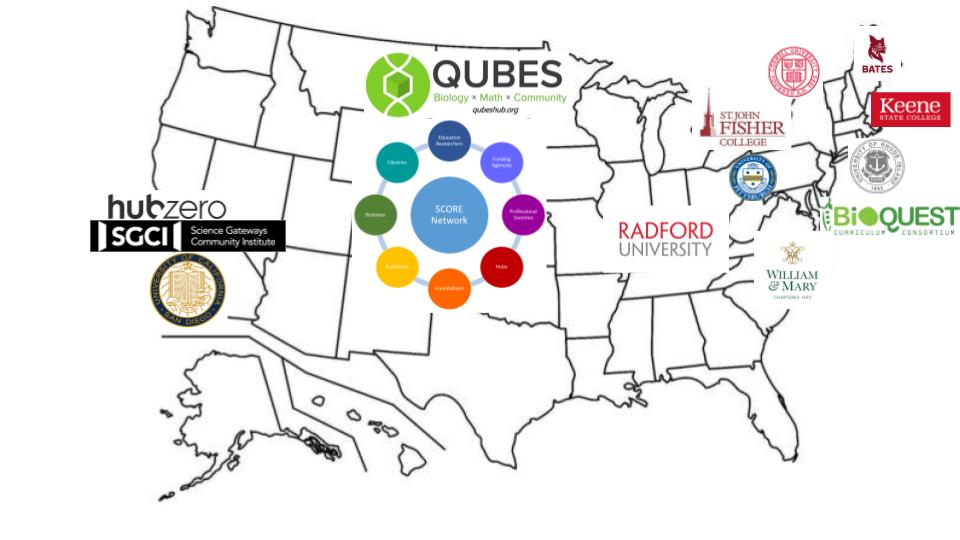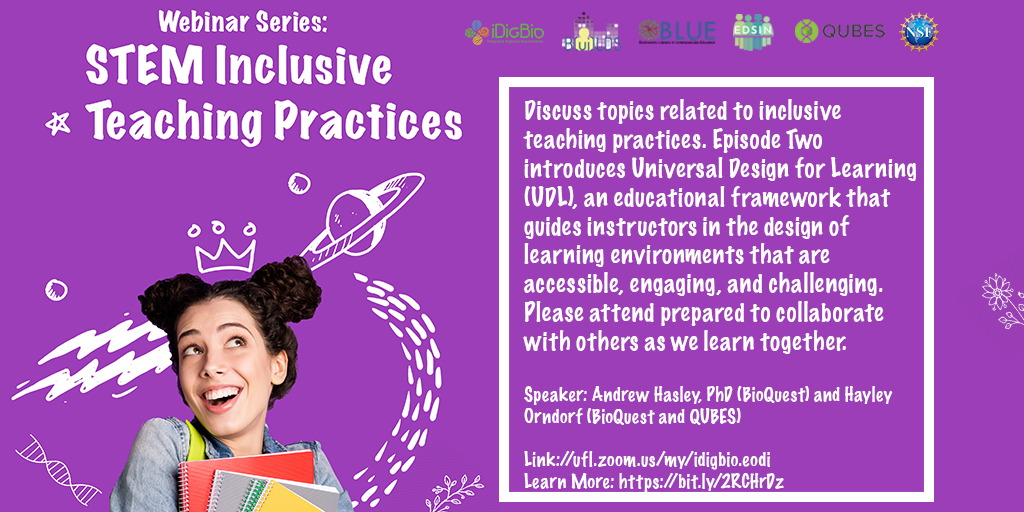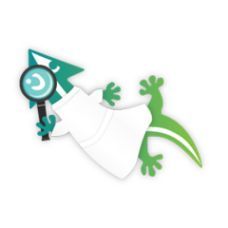
In these mini-Newsletters, we continue to focus on the rapid, nationwide transition to online education, highlighting resources for now, and next steps for collaborations within the new normal.
Teaching Quantitative Biology Online: OERs, Forums, and Community

Professional societies are responding with guidance for colleges and universities as they consider everything from grades and graduation to the tenure clock. Read the MAA’s guidance and share how other societies are leading!
Partners Are Sharing Resources, like SimBio, who has made an entire collection available online free. SimBio’s inquiry-driven virtual labs and interactive chapters cover topics in introductory biology, ecology, evolution, and cell biology, and use built-in tools to make it easy to set up, deliver, and assess student work. If you and your course are new to SimBio, we’re offering free trials of SimBio’s modules this term to help instructors move courses online. For more information, please visit the coronavirus response page on the SimBio website. (Remote Learning with SimBio - Webinar Information)
Teaching Quantitative Biology Online Office Hours provided an opportunity to talk with others in the community. Thank you to all who volunteered their time to help build community!
Resources for Teaching Quantitative Biology Online is a collection of open education resources (OERs) that are designed to teach quantitative skills in a variety of biological contexts and will work well in an online setting with minimal adaptation. This webpage is a rapid response to the need for our community of educators to move learning online quickly. QUBES partners and individuals can share and highlight modules, as well as indicating adaptations made to existing OERs. Resources (like those listed below) are posted often. Join the group to contribute your own ideas! We expect this resource to grow quickly, so check back often.
Grant from the Hewlett Foundation to expand Inclusion and Diversity Focus
The Hewlett Foundation award will support SCORE organizations who will pilot shared practices for sustainability, as well as support, invite, and expand the community of educators and OER organizations to align universal design for learning and inclusivity goals with classroom and organization practice. To move OER intentionally toward a social justice, equity, diversity, and inclusive framework, we intend to normalize these conversations and weave practices into organizational missions, curriculum development, and delivery.
 The Hewlett Foundation recognizes a challenge to Open Educational Resources (OERs) is how to keep an eye on equity and inclusion while simultaneously keeping efforts financially sustainable! Following the work of SCORE, Bates College and QUBES, the Hewlett Foundation has recently awarded Bates a one year grant to support implementation of several collaborative projects that began at the SCORE Summit (October 2019, Bates College). The Sustainability Challenges for Open Resources to promote an Equitable Undergraduate Biology Education (SCORE-UBE) Network explores the promise of equity and the realistic challenges of sustainability assumed by open educational resources (OER) in undergraduate biology education, broadly defined to include open access publications, software, and digital platforms that enhance college biology instruction. The Hewlett Foundation recognizes a challenge to Open Educational Resources (OERs) is how to keep an eye on equity and inclusion while simultaneously keeping efforts financially sustainable! Following the work of SCORE, Bates College and QUBES, the Hewlett Foundation has recently awarded Bates a one year grant to support implementation of several collaborative projects that began at the SCORE Summit (October 2019, Bates College). The Sustainability Challenges for Open Resources to promote an Equitable Undergraduate Biology Education (SCORE-UBE) Network explores the promise of equity and the realistic challenges of sustainability assumed by open educational resources (OER) in undergraduate biology education, broadly defined to include open access publications, software, and digital platforms that enhance college biology instruction.
Read the full post on the QUBES blog!

Please join us on May 13, at 3:00 pm ET at this Zoom Link.
Episode Two will introduce Universal Design for Learning (UDL), an educational framework originally developed by CAST that guides instructors in the design of learning environments and educational materials that are accessible, engaging, and challenging for all students. This episode will also offer attendees the opportunity to practice identifying and applying UDL principles to classroom activities. As this episode is designed to be interactive, please attend prepared to collaborate with others as we learn together.
Transforming the Conversation about Teaching Evaluation in Higher Education:
Thoughts from the National Academies' Roundtable on Systemic Change in Undergraduate STEM Education
Tuesday, May 19, 2020, 11:00 am PT | 12:00 pm MT | 1:00 pm CT | 2:00 pm ET
Presenters: Ann Austin (Michigan State University), Noah Finkelstein (University of Colorado Boulder), Kerry Brenner (National Academies), and Dea Greenhoot (University of Kansas)

The Roundtable on Systemic Change in Undergraduate STEM Education is a group of the National Academies of Sciences, Engineering, and Medicine that brings together national experts and thought leaders representing the full spectrum of stakeholders in higher education. In September 2019 they held a working meeting on Recognizing and Evaluating Science Teaching in Higher Education in cooperation with ASCN, AAU, and TEval. This working meeting brought together people working to improve teaching evaluation to discuss their experiences and to use the resulting information to coordinate and catalyze further actions that will leverage teaching evaluation to advance the common goal of improving undergraduate STEM learning experiences. This webinar will highlight some of the examples presented at the working meeting, themes noted by participants, and opportunities for further work that will bring these ideas to a wider audience that includes campus leaders. The webinar will provide an opportunity for participants to share ideas on what kinds of resources and events would be helpful to elevating and advancing the discussion of teaching evaluation, in particular how it relates to evidence-based instruction and faculty incentives and rewards.
Register now at this link!

Data Science For Science Teachers Boot Camp
The NIH Data Science Strategic Implementation Team is pleased to announce that the application for the Data Science For Science Teachers Boot Camp is now live! This workshop will provide hands-on training for data science tools commonly used by the biomedical research community and will enable you to:
- Network with and learn from leaders in the data science field
- Discuss strategies and success stories and form a network of educators across the country
- Learn about NIH programs that support educational partnerships and STEM programs
Here is the link for registration and more information.
Preparing for Careers in Teaching Statistics and Data Science: Virtual Workshop

A two-part workshop as part of the eCOTS 2020 program (Friday, May 15 and Wednesday, May 20).
Who should apply? The workshop is designed for graduate students and recent PhDs interested in careers in teaching statistics and data science. Priority will be given to graduate students finishing their program between Spring 2020 and Fall 2022.
The purpose of the workshop is to promote interaction, networking, and community building among recent and soon to be PhDs in statistics, data science, and relevant fields who are interested in academic and teaching focused careers and to provide them with valuable insights from leaders in the field. More details and the tentative agenda can be found at preparingtoteach.org.
Apply: Deadline is May 4, 2020 at preparingtoteach.org/apply
 Check out the HHMI Great Transitions Newsletter! Check out the HHMI Great Transitions Newsletter!
Over the past few weeks, many educators have transitioned their courses from in-person to online settings. This newsletter features resources for this transition from educators who have experience teaching in online, in-person, and hybrid settings. We’re also eager to hear from you about how we can best support you by better understanding your classes’ digital habits and how you’re using our resources with your students. See it here.
Moving a Project to a Collaborative Space? How can QUBESHub help?
Use this 6-question survey to communicate your needs for planning. The QUBESHub Team will respond, helping to support you to take your conference or project online.
Members of the QUBES team are participating in some re-imagined conferences that will be happening through the QUBESHub. Members of the QUBES team are always looking to meet others who have a passion for quantitative biology education. Reach out so we can help you gather your collaborators, move projects forward, and continue to move quantitative biology forward. Connect with us by submitting a support ticket

From left to right: Sam Donovan (Director of OER), Carrie Diaz Eaton (Director of QUBES Consortium), Kristin Jenkins (Director of BioQUEST), Drew LaMar (Director of Cyberinfrastructure), and Jeremy Wojdak (Director of Professional Development).
Do you have a product or result from a QUBES sponsored activity? Help us measure our success by sharing your product or result with QUBES. Learn how to cite QUBES.
|